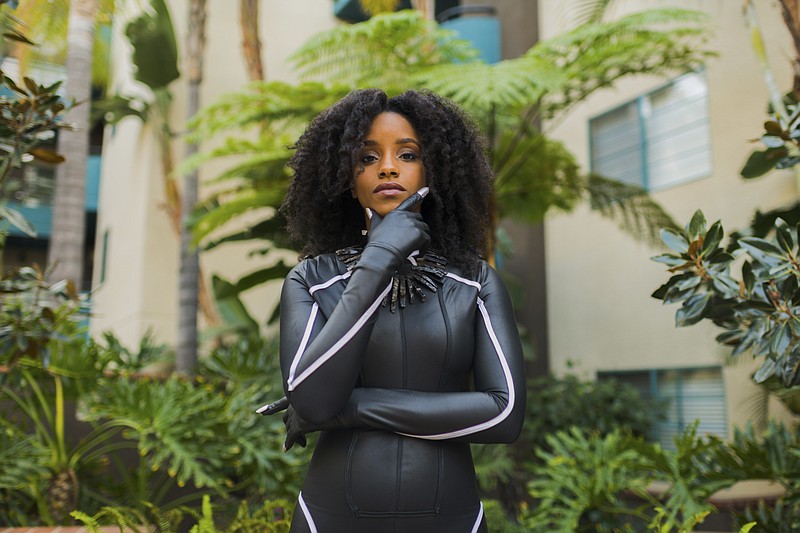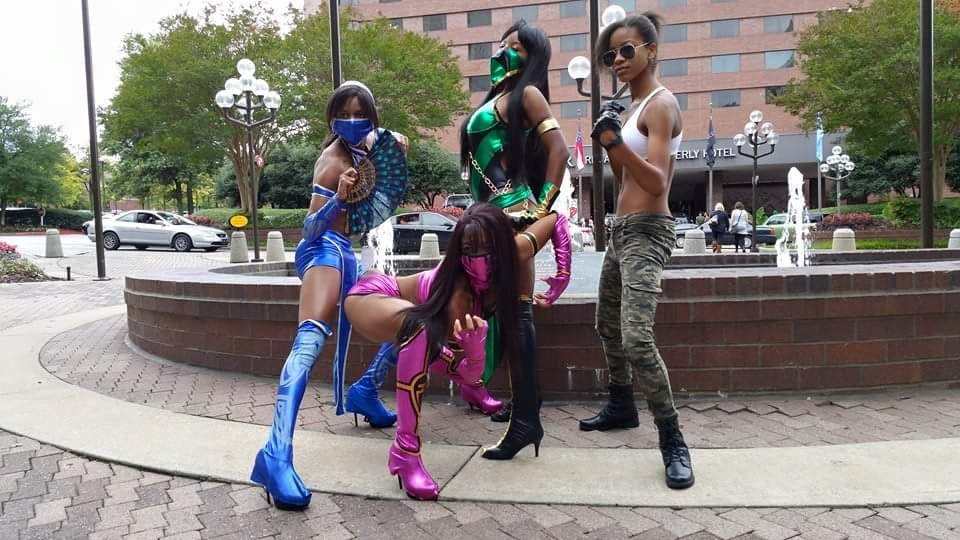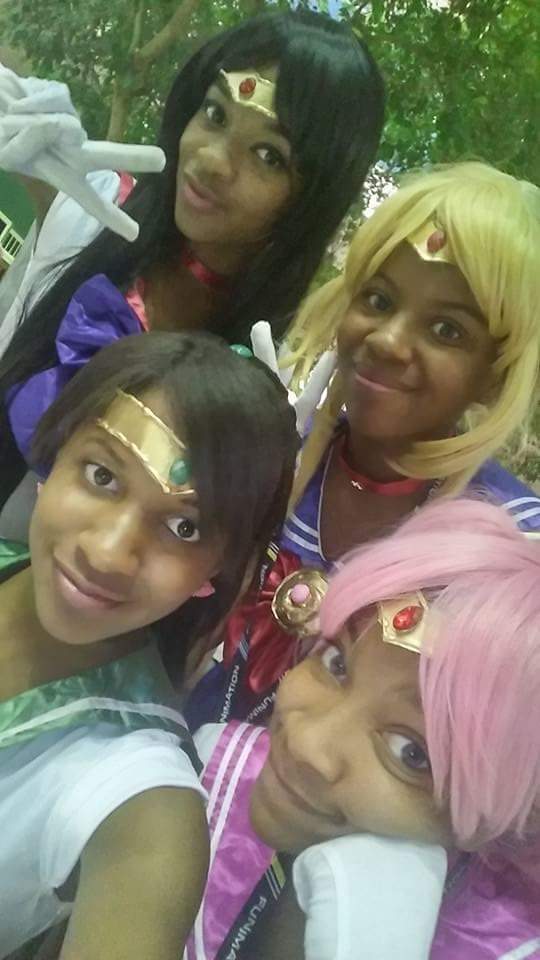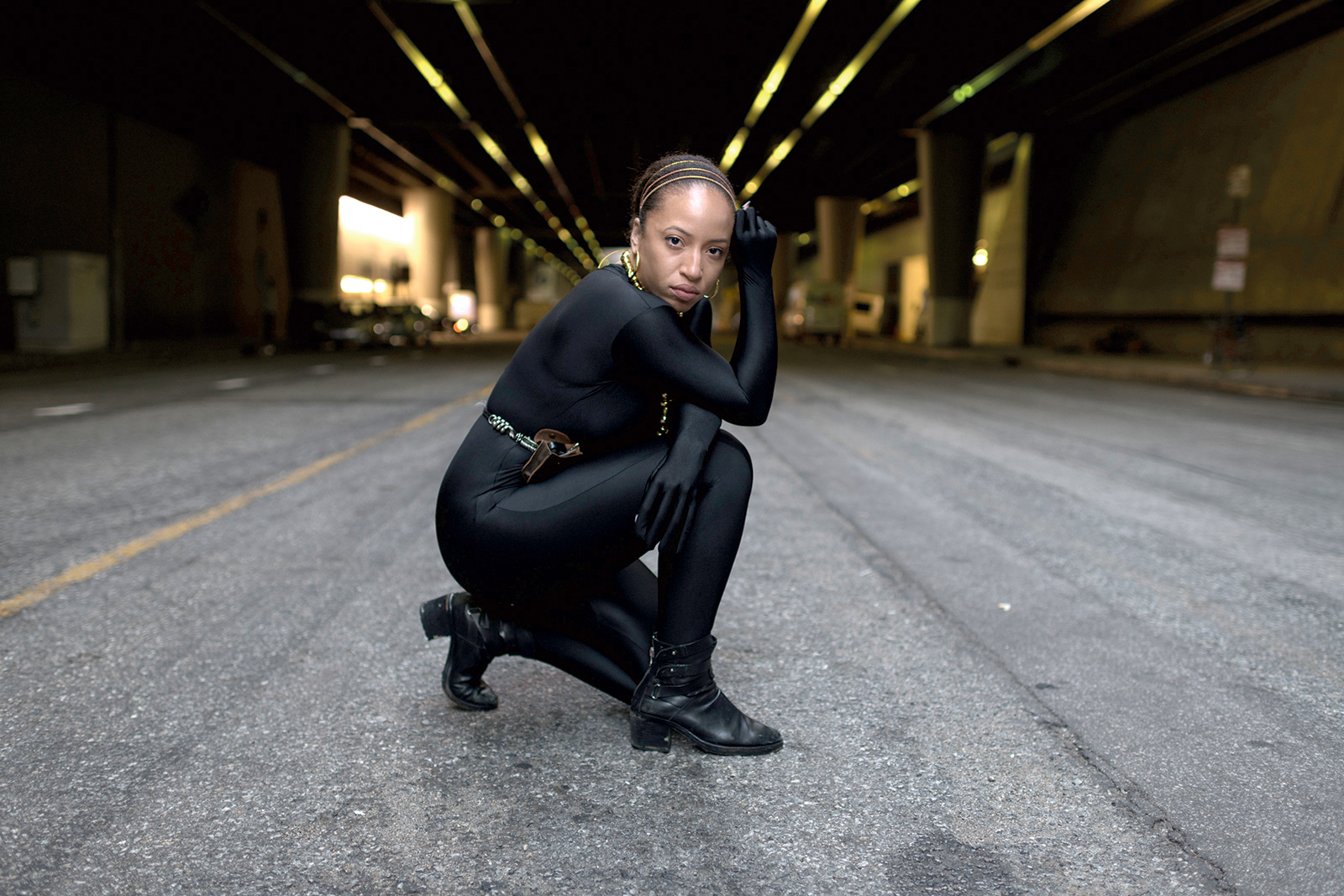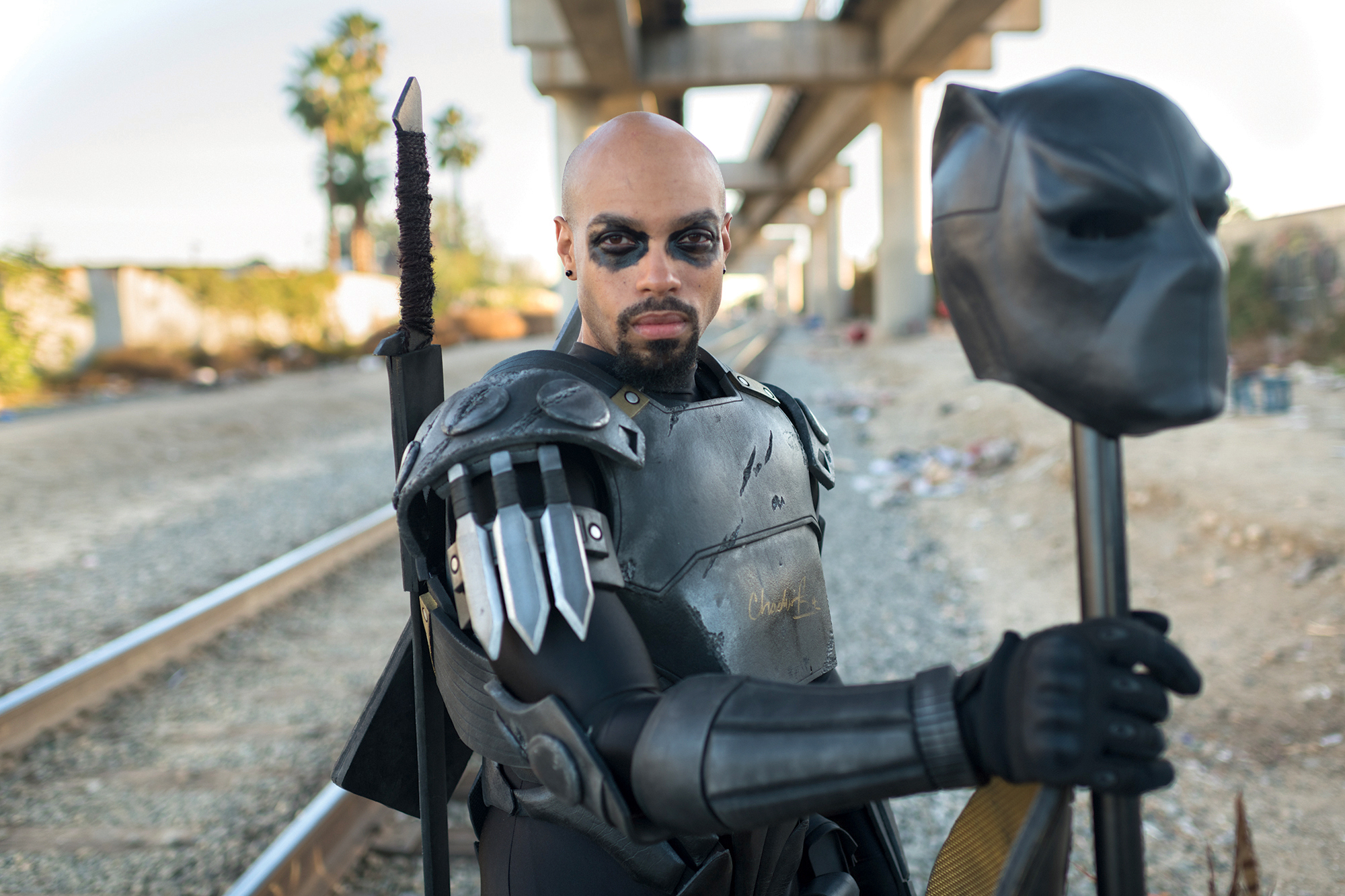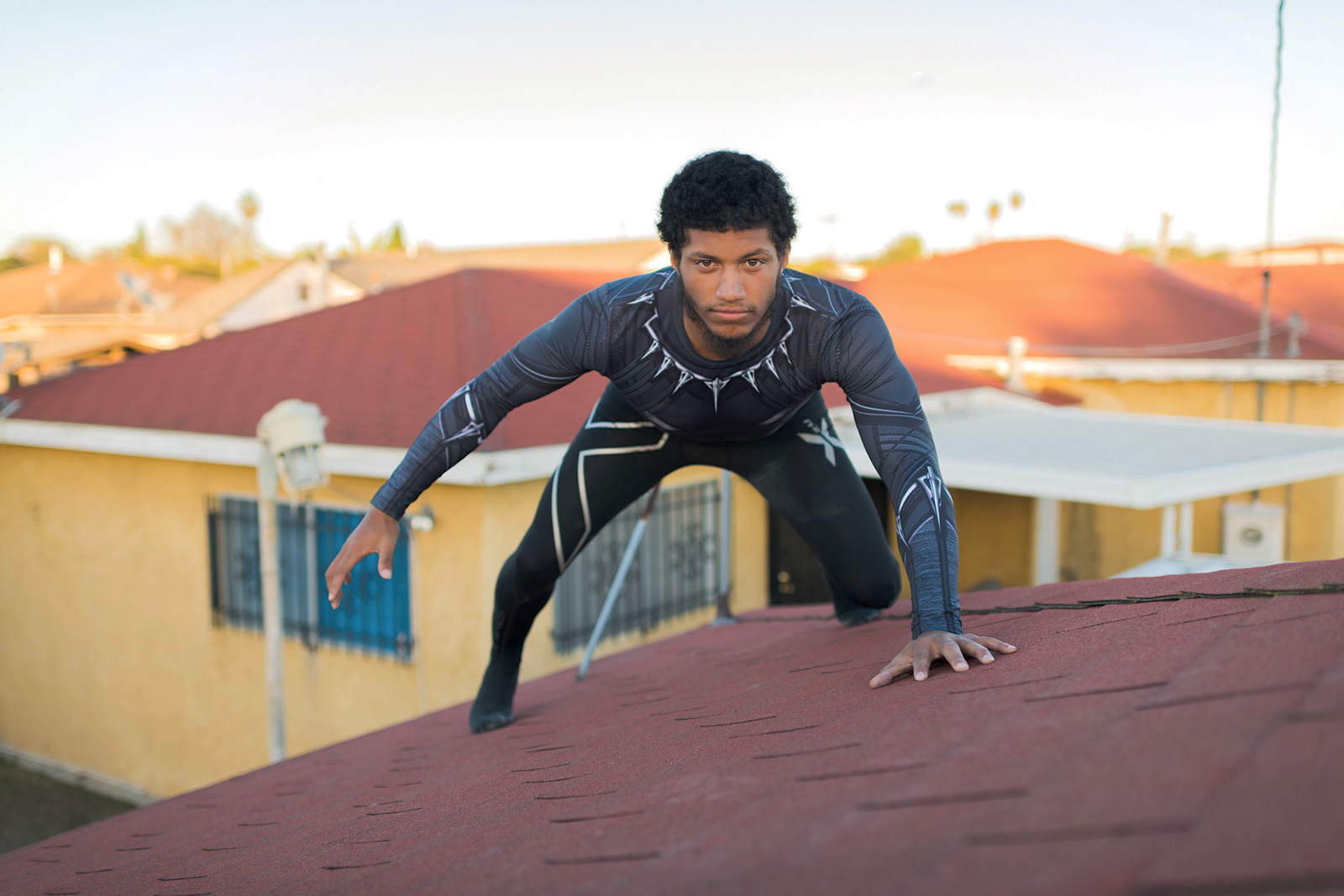Family gets in character
Credit a Japanese manga series for getting the four Chattanooga siblings known as the Chatman sisters interested in cosplay.Mom Lora Chatman says her girls — Shellyta, 27, Lora, 25, Jessyka, 20, and Zoe, 15 — started watching “Naruto,” which premiered in 1999, when they were young.“The first [fandom] convention that I helped them all go to, they dressed as ‘Naruto’ characters,” she says.They watched the series into reruns, wore out VHS tapes, memorized lines, acted out scenes and even created a fantasy book series of their own to further their cosplay.Characters from “Sailor Moon,” another Japanese manga series, and “Powerpuff Girls,” an American animated series, also have interested Chatman’s daughters over the years.“They started dressing up and buying wigs and spending all this money on clothes,” she says.Shellyta, the oldest, eventually joined the local fandom group Chattooine and has dressed up for movie premieres and special events.Youngest sister Zoe has begun making her own costumes. Her current project is a dress like the one worn by the main character, Tiana, in the 2009 animated film “The Princess and the Frog.” Tiana was Disney’s first black princess, which Zoe considers a milestone.“Disney princesses are amazing, but I still want to feel comfortable wearing them,” she says.” It’s just that I relate more to her [Tiana] than Cinderella.“Of course you can be whoever you want. That’s what I like about the cosplay community. Some people might say, ‘Hey, wait, you don’t look like that person,’ but for the most part it’s really open.”She’s especially excited by the cast of strong women in “Black Panther.”“Everyone wants to be able to kick butt,” she says. “You can always be a damsel in distress, but it takes time and skill to be a hero.”— By staff writer Lisa Denton
Black characters are rarely central to the imaginary worlds that fill the pages of comic books, which often depict them as sidekicks or villains rather than the superheroes.
That means the cosplay community, made up of fans who dress in character at conventions, movies and just for fun on weekends, is overwhelmingly white.
That is perhaps why black cosplayers in particular have been excited about the "Black Panther" film since Marvel Comics announced its release in 2014 and Ta-Nehisi Coates wrote a new series of the comic in 2016. Its hero, T'Challa, the Black Panther, lives in a fictional advanced nation called Wakanda. There, black characters can be both the hero and the villain, a three-dimensional portrait of people of African descent often left out of comic books and movies. There is a strong sense of African pride for the nation set in East Africa, one that is permeating black American culture.
The Black Panther character first appeared in Marvel Comics in 1966, but this film is Marvel's first featuring a leading black superhero and a predominantly black cast, including Lupita Nyong'o and Chadwick Boseman, directed by an African-American, Ryan Coogler, with a soundtrack by an African-American, Kendrick Lamar.
Since the superhero's introduction, there have been other black superheroes, including the Falcon (1969), Blade (1973) and Storm, the first black female superhero, who appeared in 1975.
They are not celebrated everywhere. Many African-American cosplayers believe that Instagram and Facebook cosplay groups tend to isolate nonwhite cosplayers. As a result, black cosplayers have used their own social-media accounts to create inclusive spaces. Instagram pages like Cosplay of Color and Facebook groups like The Extraordinary Journey of a Black Nerd were created to promote the celebration of black cosplay and nerd culture in America and beyond.
The goal, many cosplayers interviewed said, is to disrupt popular ideas of what cosplay can and should look like and to help create a more racially tolerant environment through cosplay, both in Black Panther costumes and outside of them.
PORTIA LEWIS, 26
Lewis, an actress and model, began cosplaying as a teenager with the Marvel character Flash. She has since branched out to other characters, including Storm, an important figure in the Black Panther legacy.
She said that being an African-American cosplayer helps create a more open world both within the world of cosplay and outside it.
"We're helping people see us as heroes," said Lewis, who lives in Los Angeles. "And I think black cosplayers are changing cosplay because we are now opening up a conversation about inclusion. We're a subculture within a subculture, and we're hoping the nerd community can be more inclusive toward us."
Black cosplayers are also helping to challenge limitations on what African-American cosplayers can be.
"Black people want to be the characters that we love, and they might not necessarily look like us, and if we want to look like them, we get a lot of backlash and ridicule and get made fun of," she said. "The hypocrisy happens when nobody says anything about white characters portraying Asian characters or others."
She hopes that she and other African-American cosplayers can help change that double standard. She also engages in cosplay for other reasons.
"When I'm in cosplay, it's the enhanced version of when I'm dressed in my regular clothes," she said. "When I wear these costumes, I get to be more than who I am."
TIA KAUFMAN, 26, and CHUK OKAFOR, 28
When Kaufman and Okafor met online, they bonded over enjoying cosplay. "I engaged with it a bit more because of my theater background," she said. "Together, our interest and excitement increased. Chuk saw how happy it made me to be in my element.
"I feel extremely comfortable in costume, and cosplaying has allowed me to envision myself as a character. I like to use my imagination and interpret characters based on whatever is inspiring me at the time, and when those inspirations, whether they're based on music, historical events, feelings, couple nicely with the identity of a character who I can relate to, I feel accomplished."
"I really liked when I heard Gil Scott-Heron's 'The Revolution Will Not Be Televised' in the film's trailer," added Kaufman, who regularly attends cosplay events with Okafor throughout Southern California. "That happened in the 1970s when there was a revolution and people were upset. That's happening again today."
Okafor, a Black Panther enthusiast whose interest in cosplay can be traced to elaborate Halloween costumes in his youth, believes that Marvel's decision to hire a black director and a predominantly black cast conveys a strong message. "Without saying it, they are taking a political stance," he said. "It's directed and the actors are mostly black, and it's for the people."
BRYNNE WALKER, 34
"We're redefining cosplay because we're putting our own spin on it," said Walker, a Los Angeles native and Black Panther enthusiast who regularly organizes cosplay meet-ups through Facebook groups like Sisterhood of the Mother of Dragons. "We add a swag to nerd culture that wasn't there."
Walker said that the film stood out for its positive portrayal of Wakanda, an African nation that was never colonized by European nations.
"It's the first time in America cinema narrative where you have a country full of noncolonized black people that are all science prodigies and geniuses," she explained. "This film is about autonomy, especially the film's interest in science and technology, which I didn't see when I was growing up."
Walker said that she and other black cosplayers had faced harassment by white cosplayers, who used racial epithets in online communities and forums.
She feels that black cosplayers are improving the aesthetic of the broader community.
"I've seen some messed-up wigs and some unrealistic hairlines and curl patterns in cosplay, and that's not sexy," she said. "We make it sexy."
SEAN SHAW, 31
Shaw, a Los Angeles native and yearly comic convention attendee, remembers the first time he put on a Black Panther costume, almost five years ago.
"I went to the San Diego Comic-Con, and a little white kid walked up to me and said, 'You're the Black Panther!'" he said.
"He couldn't see me, but I was tearing up inside of my mask," he added. "It was powerful."
Shaw, a father of two, believes that he and other African-American cosplayers demonstrate why the comics world needs more characters like T'Challa, the Black Panther.
"It's going to be great for people of color once they start seeing that there is a black superhero who is a king and graduated with honors from four different schools," he said. "When I don the costume, I feel like I embody the character. I am no longer Sean; I become the king of Wakanda."
TERRANCE DOWELL, 26
Dowell has found communities of online African-American cosplayers like The Extraordinary Journey of a Black Nerd group on Facebook that gather to make prop weapons to celebrate movie premieres and attend comic conventions like the San Diego Comic-Con.
"I've always been into anime, and then one day I fell in love with comics," he said while gripping two metal rods that he often uses as props for his Black Panther outfit. "It feels great to see other people at conventions and getting hyped over the same characters."
Though he is happy about the film, he does and will keep dressing as characters who are not black.
"It's harder for you to be seen when you don't look like some of the characters that we see in the comic world," he said. "You take it in stride, but we always put our own black twist on it when we perform and dress up."
NOAH TROTTER, 21
Trotter's cosplay journey began as a young teenager with the release of one of the films in the "Spider-Man" series. This self-described "Marvel geek" is usually the only person in cosplay among his friends and on the field of his California State University, Long Beach, college rugby team, where he frequently plays while dressed as the Black Panther.
"This film is a chance to help change the mindset of the comic and Marvel world that are sometimes racist toward black people," he said, citing online backlash that he has experienced, including people photoshopping and posting racially charged words and stereotypical imagery about the Black Panther.
Trotter is looking forward to the film's soundtrack by Kendrick Lamar.
"The cosplay world may not be ready for this," he said of the album. "It's going to be lit."
